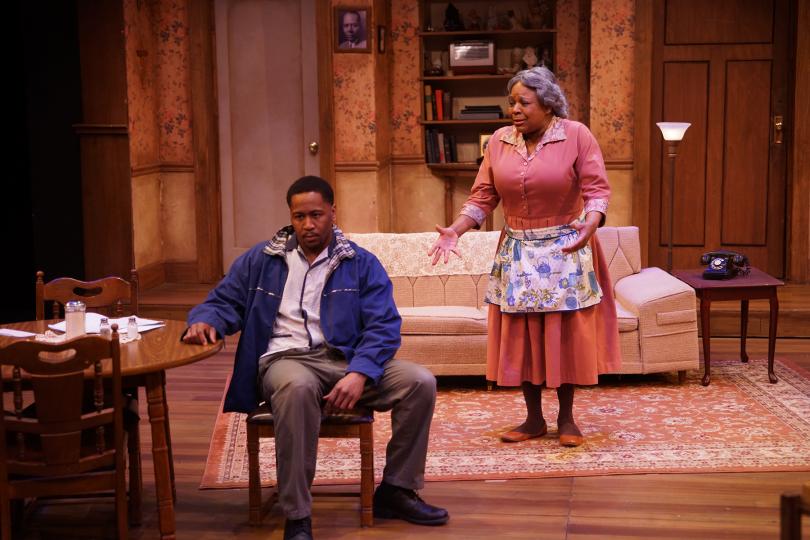So...what DOES happen to a “dream deferred?”

If you’re a theatre scholar, and even if you’re not, you’ve probably heard of renowned playwright, Lorraine Hansberry. An African American woman, she grew up in Chicago with activist parents and attended a segregated school. She studied at the University of Wisconsin and then lived in New York City in the early 1950s. A paramount influence of the Civil Rights Movement, she was one of the first black intellectuals to use the stage to portray working-class African-Americans, facing the inherent fear that it might perpetuate negative stereotypes. She felt that writing about the lower class would actually help debunk those stereotypes and her critically acclaimed play, A Raisin in the Sun was part of a broader shift in black art towards depicting working-class, ordinary people, as well as being the first production on Broadway that was written by an African American woman and with a Black American director, Lloyd Richards. It debuted on The Great White Way (ironic no?) in 1959 and won the New York Drama Critics' Circle Award. (see A Raisin in the Sun) It was nominated for four Tony Awards in 1960, including Best Play, Best Actor in a Play, Best Actress in a Play, and Best Direction of a Play.
Some say Raisin marked “a watershed moment in American theater” and captures the racial dynamics of the time. The play's setting covers a pivotal time period for race relations in America – beginning right after WWII and before 1959 and the official start of the American Civil Rights Movement. When Americans (all races, religions and creeds) fought in World War II, they were fighting for freedom and equality for all. Uncovered as blatant hypocrisy, this story was a prefect example of the very UNequal conditions for blacks back on American soil.
Not only was this play timely in the 1950’s and 60’s but it’s sadly just as applicable now. As a person of white privilege it’s very hard to stomach the sole white character in the play using the term “you people” over and over. Cringing, I realized it was less about hearing it in the context of the play (which is bad enough), but more with the staunch awareness that this devissive attitude is just as prevalent in our current socio political climate today. How I wish this wasn’t true. Luckily we still have writers willing to address these issues and companies willing to tell their stories and hold up the proverbial mirror.
Park Square Theatre does a lovely job of bringing this fifty-eight year old time tested play to life. Set in their Andy Boss Thrust stage, Scenic Designer, Lance Brockman, places the audience outside the apartment looking in through their one tiny window. It was an unique point of view and was great to have access to the actors from the front instead of watching cooking and cleaning from the back, a more traditional stage setup. The stove was impressively fully functional and the smells of RUTH making morning eggs and coffee put me in a breakfast mood when the lights came up. The design team compliments the urban rundown setting with a wash of sepia lighting (Michael P. Kittel), 1950’s middle class style (A. Emily Heaney), and eccentric, yet classic props (Sadie Ward). Add to all of this the dreamy, melancholy saxophone transition music (sound by Evan Middlesworth) romanticizing the family’s relentless pursuit of their “American Dream,” and we’ve been transformed to a cozy yet cramped slice of real “southside” life.
Though the play is modern realism, it definitely can lend itself to keening melodrama. While an inherent trap that this production falls into on occasion, most of the time the actors have a wonderful familial comfort level that is engaging and honest. Director, Warren C. Bowles, has a clear reverence for the play and nurtures the production as dearly as MAMA LENA (a tenacious and sassy Cynthia Jones-Taylor) tends to her anemic plant desperate for more sun and fresh air, (the lovely metaphor for the Younger family struggling to survive in their tiny Chicago's Woodlawn apartment). Like Jones-Taylor, the other actors meet the proverbial raised bar and give these three dimensional characters attention and adoration. Some highlights include, Ivory Doublette, as a sweet and understated RUTH, Darrick Mosley playing the assertive and self confident Nigerian student ASAGAI, and WALTER LEE YOUNGER, portrayed by Darius Dotch with conviction and great comic timing. I also want to shout out to youngster, Calvin Zimmerman, who plays ten year old TRAVIS, with frankness and joy. He is a pleasure to watch.
Although the play is a portrait of the African American experience, it also covers other themes relating to universal family trials. Generation gaps, money problems, the debatable existence of God, and maybe most importantly, searching for identity while staying tethered to family history and the lessons of the past. Add that to assimilation and the lack of cultural pride and appropriation and it could be downright painful, but the production and all of it’s moving parts find the humor, love and respect that hold the Youngers together.
It’s a lovely evening at the theatre. Not just the serious gut wrenching topics, there are relationships mended, jokes landed, and an outcome worth cheering. Although I think Park Square should advertise more (I only knew it was being produced because of our Playlist Editorial Calendar), I’m happy they’ve made the choice to tackle this important and influential timeless piece. Lorraine Hansberry is an American treasure and to think that she passed away from cancer at 34 (thanks for the info program notes)! The ground she broke and ceilings she busted so young, imagine if we’d had her for longer? She is as inspirational as a woman, a person of color, and as a young person (she’d be a millennial today) now as she was then. Who says young people aren’t serious and can’t make things happen? I’d gladly discuss plans for humanity's future with her ANY day.




